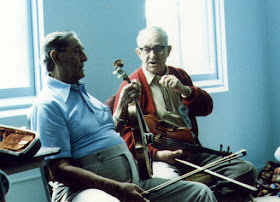I've seen him on the radio. He was playing the guitar with Leo Soileau. Sometimes he'd take Leo's place and play one on the fiddle. On KPLC at the old Majestic Hotel. On the guitar, he was exceptional, but he played fiddle real good. He was a musician-and-a-half.1
Allons, s'en aller dans les grand bois,C'est pour voir ma belle, petite, chérie,Tout mon misère, ma chère petite fille,Quoi faire tu m'laisses comme tu laisses, mais, quoi t'as fait?Malheureurse, mais, pas fais bien,Tu m'as laissé, mais, moi tout seul,Dans la grand bois, mais, chère tit fille,Ça fais du mal quoi t'as fais ton pauvre vieux chien.Oh, mais, malheureurse,Chère 'tit fille, mais, se quand meme,Tu faire ça, mais, quoi t'as fais,Ça tu prends, malheureurse, ça fais du mal.Eh, cherie, oh, petite,Quoi t'as fais, chère, ça m'fais de la peine.
 |
| Church Point News Aug 17, 1948 |
The area in Louisiana known as Big Woods resides between Sulphur and Vinton. "Big Woods" (#1011) represents the last recording containing Harry's original 1946 Melody Boys. For unknown reasons, record producer Bill Quinn chose to shelve the recording; eventually having it sold to and pressed by Hummingbird Records of Waco, TX after 1955. Soon after this session, Joe Manuel would leave the group and join his brother Abe Manuel playing under different names in Corpus Christi. Porkchop Roy, who worked with Harry during those early years remembered all of the Quinn sessions,
Harry played Cajun music with a western swing. We recorded Jole Blon in 1946 and it was Choates version of the popular French song which first became a big hit. The recording sold over a million copies. We got $800 for making it. We cut 10 more songs for Quinn after making the Jole Blon record and all we got for that was a Mexican supper.2
Come on, let's go to the big woods,It's to see my beauty, my little dearie,All of my miseries, my dear little girl,Why you left me, the way you left me, well, what have you done?Naughty woman, well, up to no good,You left me, well, i'm all alone,In the big woods, well, dear little girl,That was terrible what you've done to your poor old dog.Oh, well, naughty woman,Dear little girl, well, even still,You did that, well, what you've done,You can have it, naughty woman, that was wrong.Hey, dearie, oh, little one,What you've done, dear, it hurts me.
- Wilson Granger interview. Andrew Brown. 2005.
- "Cajun Musician Curzey Roy Recalls the Robust Rhythms". Fannie Genin. DW. Sep 1984.
- Lyrics by Stephane F
Release Info:

























